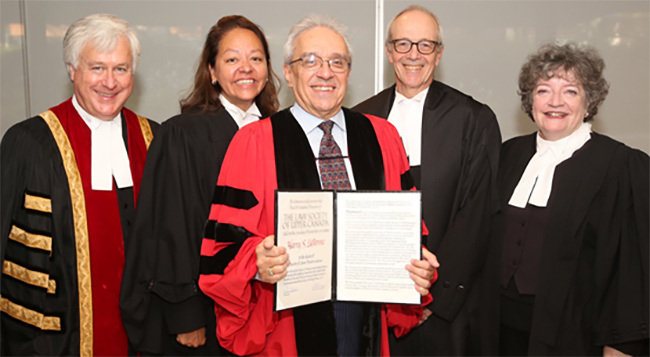Justice LaForme recognized with honourary Doctor of Laws degree

By Rick Garrick
TORONTO – Justice Harry S. LaForme credits his role as the first Indigenous person on a Court of Appeal in Canada for being recognized with an honourary Doctor of Laws degree.
“It was presented to me by the Law Society of Upper Canada, which is the governing body for lawyers in the province (of Ontario),” says Laforme, a Mississaugas of the New Credit citizen. “They occasionally give out these awards for people that they think have done good or represented their community, and me being the first Indigenous person ever to sit on the Court of Appeal in Canada, they thought they would celebrate it.”
LaForme was presented with the honourary LLD by Paul Schabas, treasurer of the Law Society of Upper Canada, during the Law Society’s Sept. 27 Call to the Bar ceremony in Toronto. LaForme also delivered the keynote address during the ceremony, which included comments about having few dreams about the possibilities that life held when he was a child.
“Little did I know that my family, my friends and events would influence my path and significantly alter my dreams,” LaForme says during his keynote address. “I discovered that not only should I learn to have those different dreams, but that I should work to make them come true.”
LaForme says his dreams began to include the place that his people occupied in Canada and that law was at its roots.
“Through this I learned that I have a responsibility to my family, my people, my ancestors, my community and my Canada,” LaForme says. “That is because, as I learned, I am part of them and they are a part of me. We are all treaty people in Canada.”
LaForme says there were only about three or four Indigenous lawyers across the country when he attended law school in the 1970s.
“Now there are maybe a thousand,” LaForme says. “And a lot of them represent Indigenous interests, a lot of them work for First Nations, a lot of them work for Indigenous organizations. They work on land claims issues, they work on treaty rights issues and try to resolve them in the courts. They work on Gladue issues about the over-incarceration of our people in the prisons.”
LaForme began pursuing a career in law after the federal government developed the White Paper that aimed to abolish the Indian Act in 1969.
“When the issue of Indigenous rights in Canada got threatened by the White Paper policy, I just followed my grandfather and my uncles into the political arena,” LaForme says. “That’s when I appreciated that law was going to be a big part of it, and then I went to law school.”
LaForme was called to the Bar in 1979 after graduating from Osgoode Hall Law School in 1977.
“For years I represented Indigenous clients and did a lot of work on a lot of things, like developing land claim policies,” LaForme says. “I flew over to England when the (Canadian) Constitution was being patriated (in 1982) to try to see if we could make sure the Queen was going to honour her treaty obligations and the honour of the crown.”
LaForme also chaired two Royal Commissions on Aboriginal issues — the Indian Commission of Ontario in 1989 and the Indian Claims Commission in 1991 — before he was appointed to the Ontario Court of Justice (General Division) in 1994. He was appointed to the Court of Appeal for Ontario in 2004, the first Indigenous person to be appointed to a Canadian appellate court.
“And I’m still the only one,” LaForme says.


